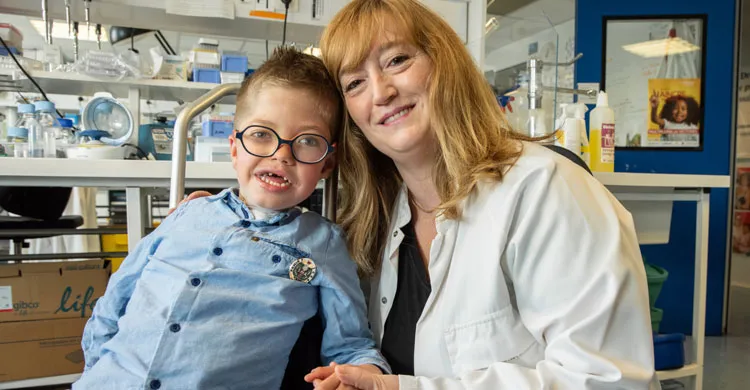Myotubular myopathy: gene therapy trial results demonstrate major improvement of motor and respiratory functions
The Lancet Neurology published on November 15 the clinical results of a gene therapy trial using a drug candidate developed at Genethon in 24 children suffering from myotubular myopathy, a rare genetic muscle disease.

This gene therapy was developed by the team led by Ana Buj Bello, Head of the Neuromuscular Diseases and Gene Therapy team at Genethon and Director of Research at Inserm. It combines an adeno-associated viral vector (AAV8) and the MTM1 gene. In 2017, AUDENTES (now Astellas Gene Therapies) launched the international clinical trial to test the drug candidate developed by Genethon.
24 children under the age of 6 suffering from myotubular myopathy and on respiratory assistance at least 22h a day were then treated in two cohorts: 7 of them at the lower dose, 17 others at the higher dose.
Five years on, the results show that the treatment is effective, with major therapeutic effects, enabling the majority of treated children – who had previously been hypotonic, tracheostomized and gastrotomized – to breathe on their own, stand up and, for some, even walk. Severe adverse effects leading to the death of 4 children are currently under investigation.
The results in detail:
- 16 children were able to do without respiratory assistance, previously indispensable 22 hours a day, between 14 and 97 weeks after treatment.
- 20 children could sit up for at least 30 seconds. Of these, 12 could stand up on their own and 8 could walk without support, whereas no child could do so before treatment.
- 4 children showing signs of pre-existing hepatobiliary pathology.
“These clinical results show both how spectacularly effective gene therapy can be, and the challenges that remain, particularly in terms of adverse effects in certain contexts. While our teams are already committed to understanding and anticipating these issues, the knowledge gained from this clinical trial, which highlights certain limitations and particular hepatic susceptibilities, is rich in lessons for the entire scientific community. I would like to salute the excellence of Ana Buj-Bello’s work, which has led to major therapeutic effects in the majority of children treated, and which represents the first potential treatment for this rare and fatal disease ” adds Frédéric Revah, CEO Genethon.
In France, a young patient, Jules, was treated at the I-Motion pediatric clinical trial center at the Institute of Myology, Paris, by Dr. Andreea Seferian, neuropediatrician and trial investigator. Before treatment, Jules could not breathe, speak or eat. Since the gene therapy was administered intravenously in 2020, progress has been impressive. Today, Jules is increasingly autonomous: he breathes without assistance, walks, bikes, climbs stairs, runs, plays soccer… Discover his journey in pictures
“I’ve devoted my entire career working on myotubular myopathy. It took years of research to imagine, design and demonstrate the efficacy of gene therapy for this very severe and complex disease. Even though we absolutely must understand the reasons for the adverse effects observed in this clinical trial, it is exceptional to see children who were known to be doomed make incredible progress thanks to this drug candidate” emphasizes Ana Buj-Bello, Head of the “Neuromuscular Diseases and Gene Therapy” team at Genethon, Research Director at Inserm and co-author of the preclinical work that led to this clinical trial.

